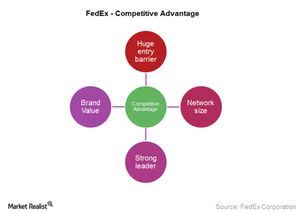What Are FedEx’s Key Strategic Business Advantages?
FedEx has been in the marketplace for over 40 years. It has established a huge network spread across more than 220 countries and territories worldwide.
July 3 2015, Updated 9:05 a.m. ET

Huge entry barrier
To establish a company in the delivery services industry that can match up to the scale and size of FedEx (FDX), it would require a lot of capital investment. The delivery service industry required the company to have a high fixed cost structure to be able to establish various distribution centers and purchase the required trucks and planes.
Even during later stages, companies require huge capital investments to grow continually. This means that in order to be profitable, any new company would require the capacity to incur losses in the beginning, provide customers with lower costs than competitors, and build up large volumes of orders quickly.
Strong and large global network
FedEx has been in the marketplace for more than 40 years. It has established a huge network spread across more than 220 countries and territories worldwide. A network of this strength and size is difficult to replicate for any company. FedEx still continues to grow its network in ground services with various acquisitions.
Established brand value
FedEx has successfully established a very strong brand value in the marketplace and among its customers. The company is trusted for its reliability and timely package delivery services. This brand name has helped the company grow rapidly into a billion-dollar company.
Strong management
FedEx was built by a visionary and talented founder and CEO, Fred Smith. He built a company that changed the way logistics work across the globe. He has successfully managed the company during good and bad times.
These advantages give FedEx a competitive advantage.
FedEx forms the largest holding of 13.14% in the iShares Transportation Average ETF (IYT). Similar companies included in the ETF are United Parcel Service (UPS), Expeditors International (EXPD), and Con-way (CNW) with 7.6%, 4.19%, and 3.19% holdings, respectively.
